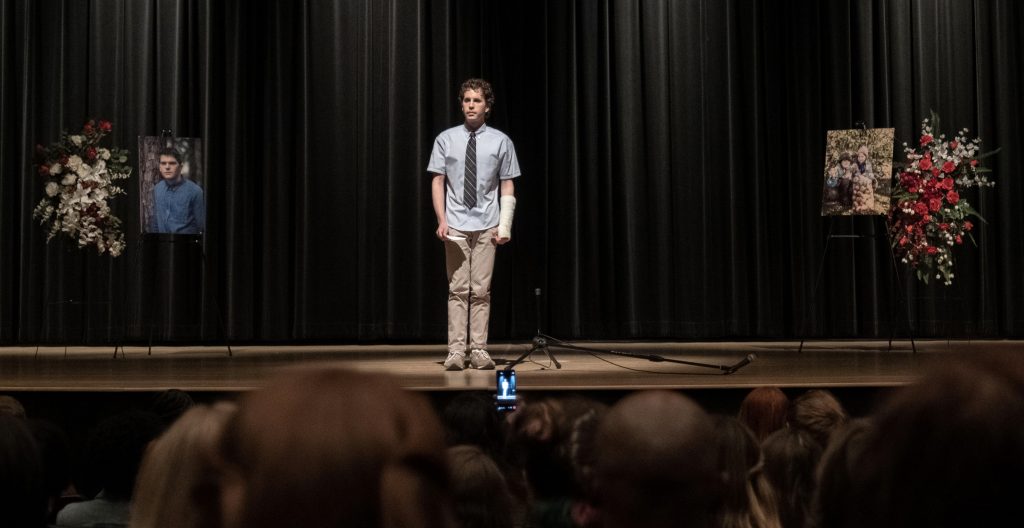No doubt, many of us could name at least one Hollywood title that follows a misfit teen trying to find his or her place in the world. “The Breakfast Club,” “Napoleon Dynamite,” “Dead Poets Society,” “The Perks of Being a Wallflower” … the list could go on. Some are humorous, some tragic, but they all touch on the search for identity and belonging that characterizes adolescence.
At first glance, Universal’s upcoming film version of “Dear Evan Hansen” is another such production. In the opening scene, we meet the titular character (played by the golden-voiced Ben Platt) starting the first day of his senior year convinced that to everyone around him, he is invisible.
But as Evan’s story unfolds, it proves to be not your typical high school drama.
It’s not just for the fact that in making the film, director Stephen Chbosky takes on a Tony-award-winning Broadway musical — which, as it turns out, suits the screen well. From the opening number, the music combined with the close-up view of the characters on screen blends the spectacle of the stage with the intimacy of a diary.
But unlike other troubled teen protagonists, Evan does not spend the movie trying to fit in. Although his struggle with anxiety and depression often paralyzes him in social settings, he finds people to connect with right away. But there’s a catch.
When the Murphy family interprets a note Evan wrote to himself as their son Connor’s (Colton Ryan) suicide note, they conclude that Evan must have been Connor’s one and only friend. Unwilling to cause them more pain, Evan goes along with the illusion, which soon morphs into a mental health awareness movement.
Because the imaginary friendship generates so much consolation and hope, the movie is fraught with tension. We cringe knowing that each character moved by Evan’s memories with Connor is being duped. And yet, the image of such a supportive friendship is so comforting that we find ourselves wanting to believe it too.
“Dear Evan Hansen” highlights something embedded in our human nature: our hunger for friendship. And in a culture battered by the erosion of faith, the breakdown of family life, and the isolating effects of social media (all on display in the film), friendship seems rarer and more precious than ever before.
The question is, how many of us would buy into a white lie in order to enjoy even the semblance of friendship? According to this movie, apparently everyone, since that white lie dazzles almost every character it hits, and among audiences it has drawn a huge fan base and propelled the show to win no less than six Tony Awards.
Why? What is so compelling about Evan’s story? It speaks to the outsider in all of us. What makes the story of “Dear Evan Hansen” different is that its protagonist is not alone in his loneliness.
Every character we meet — and not just those with antidepressant prescriptions — struggles with some sort of pain, fear, guilt, and above all, an aching need for companionship. We watch Julianne Moore as Evan’s single mom working to make ends meet while repeatedly trying (and often failing) to spend quality time with him. We find that the super-social Alana (Amandla Stenberg), who takes on an abundance of student leadership roles, is constantly working to hide her own battle for mental health. And when a video of Evan speaking at Connor’s memorial service goes viral, we hear thousands more voice their sense of isolation.
Granted, it seems far-fetched that an entire family, school, and community could be fooled by one simple story. But so desperate is Evan’s loneliness that he slips into the fantasy friendship all too easily, and so eager is everyone else for the reassurance that true friendship is possible that they latch onto it without hesitation.
When Evan first builds the illusion in the song “For Forever,” his expression brightens just as much as the look he sees in Mrs. Murphy (the optimistic against all odds brought to life by Amy Adams). However unlikely a scene it might be, both characters find comfort in the image of two outcasts enjoying a perfect day as friends.
But however much “Dear Evan Hansen” shows the happy circumstances a lie might create, it does us the favor of reminding us that it remains a lie, and that as a result, it can never fill the hole of loneliness. This reality brings the film to a messy resolution, as can only be expected when such a pleasant illusion shatters.
On the one hand, the film’s conclusion leaves something to be desired, since it does not replace the imaginary friendship with a real one. This could be read as a bleak message indeed: that maybe in our modern world, where people hide behind screens and feel compelled to uphold a facade of perfection, genuine friendship is simply beyond our reach.
On the other hand, Evan’s journey is a catharsis that ends in tranquility, because it shows us the hard way that the truth is the only reliable source of consolation. Honesty might sting, but it opens the door to hope for a new beginning. And with that new beginning, we can come to know and love one another anew, as we really are, as friends.
However impossible true friendship might seem in “Dear Evan Hansen,” the film makes painfully clear that as humans, we need friendship to survive, and that, as soothing as an imaginary friend might seem, nothing less than the real thing will suffice.
“Dear Evan Hansen” opened in theaters September 24.

